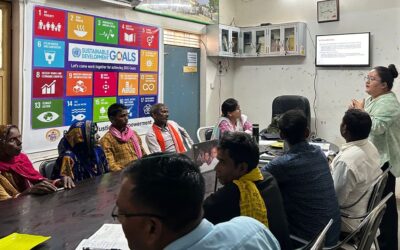The liberation of workers from slavery is a critical part of building a world free from persecution and injustice. In India’s notorious “brick belt,” caste discrimination is a major reason the country is a global slavery hot spot. Free the Slaves is dedicated to ending the economic, social and political conditions that allow modern slavery to exist.
This inspiring story of liberation, which happened a few months ago just before the COVID-19 lockdown, underscores how important it is to reaffirm our dedication to ending modern slavery as the global economy restarts and resets.
The story starts with a simple family visit. A woman who had received human rights training from Free the Slaves and our India partner MSEMVS discovered from relatives that her aunt was trapped in a brick factory compound with 19 others. They had been there for five months, forced to work, abused when they dared ask to be paid.
Fortunately, the Free the Slaves trainee knew just what to do. She was part of a vigilance committee that works to enforce India’s law against the enslavement of people who have borrowed money. “Bonded labor” slavery is no longer legal, but the practice is still widespread.
The woman managed to reach her aunt by cell phone, and let her know that freedom was possible by reaching out to the community-based bonded labor vigilance committee near the brick kiln. The simple phone call set the journey to freedom in motion.
The enslaved workers phoned the vigilance committee and were encouraged by what they heard. So encouraged, in fact, that they decided to stage a mass escape from the brick kiln. They told the slaveholder they were going to the market to use their government food ration coupons. Instead, they rushed directly to the office of the district magistrate.
They were free — 20 men, women and children.
The assistant labor commissioner provided food and safe shelter overnight as MSEMVS field workers took statements from the survivors for a court case. The next day, 20 people who had given up hope of a decent life and dignified work were reunited with their families.
The survivors say there’s a lesson for everyone in India in their story: “If laborers are united and keep the contact numbers of authorities and take action collectively, slavery can be ended.”
Learn more about our work in India here.
Editor’s note: this story was reported by Manoj Kumar Mishra of MSEMVS



